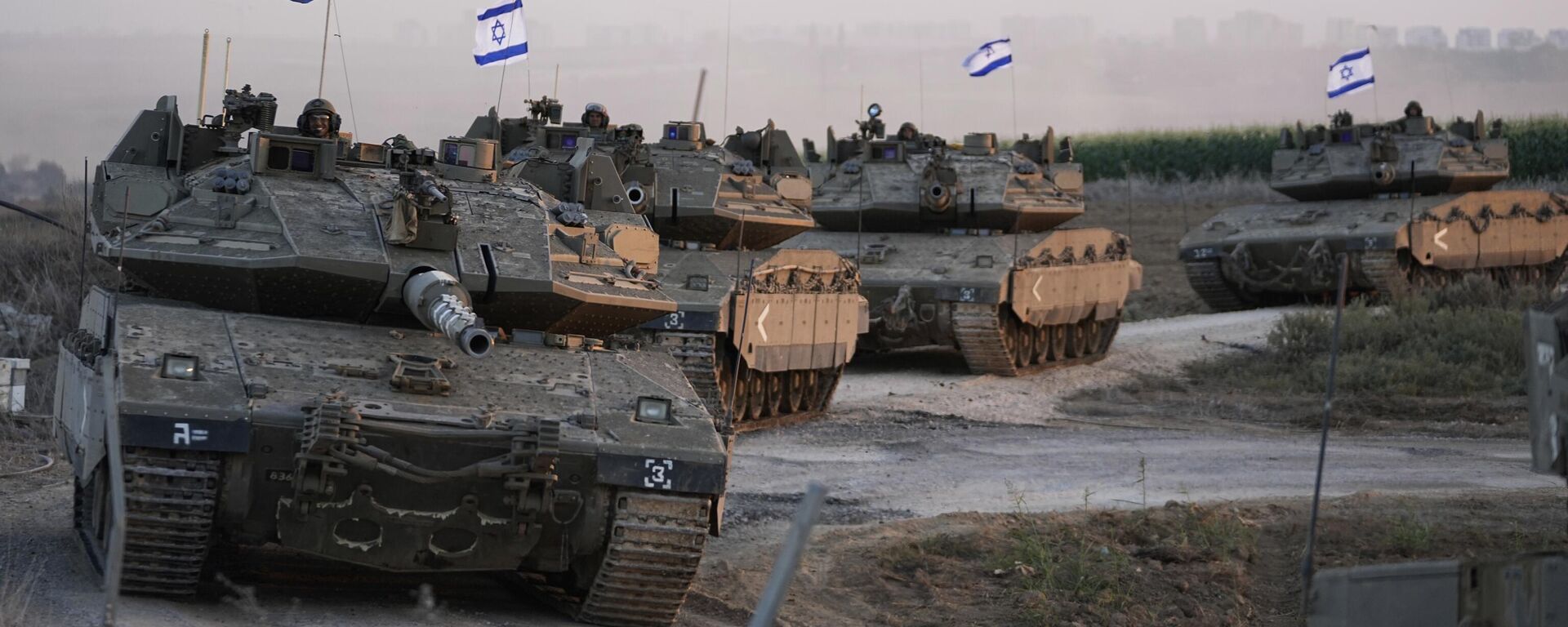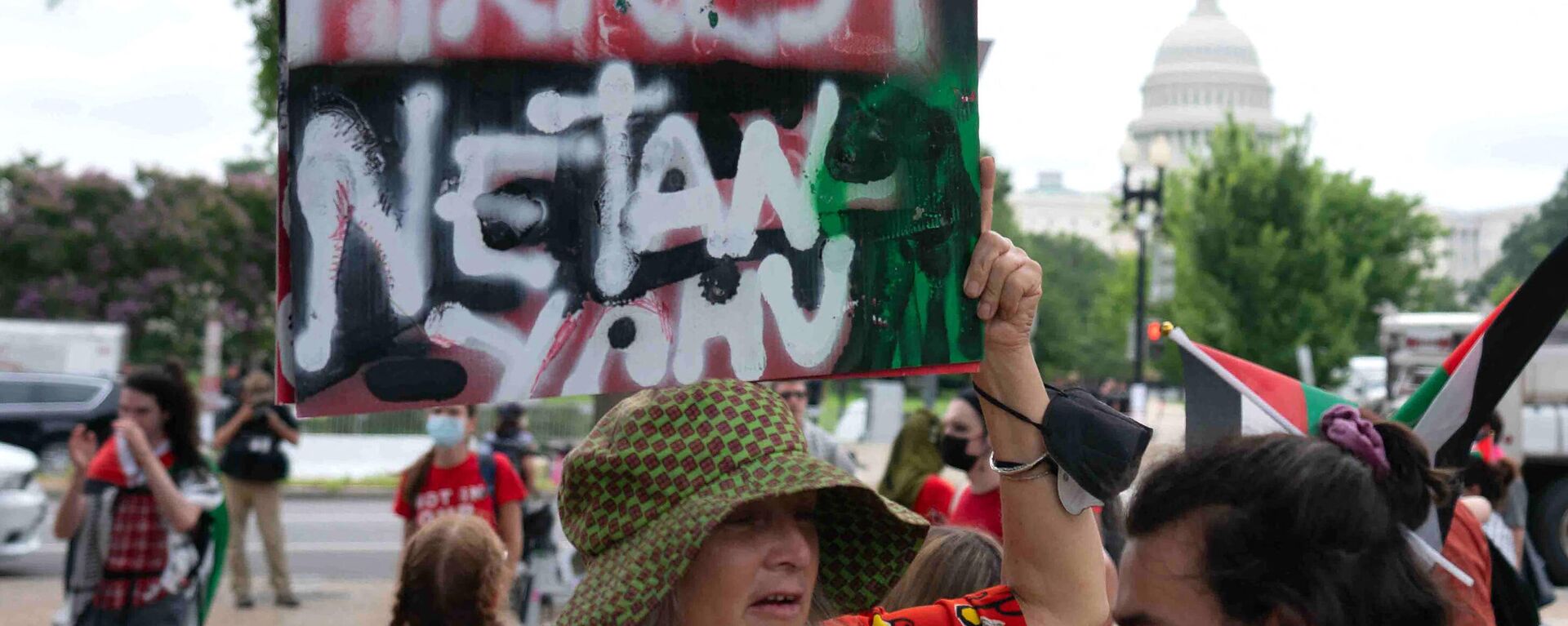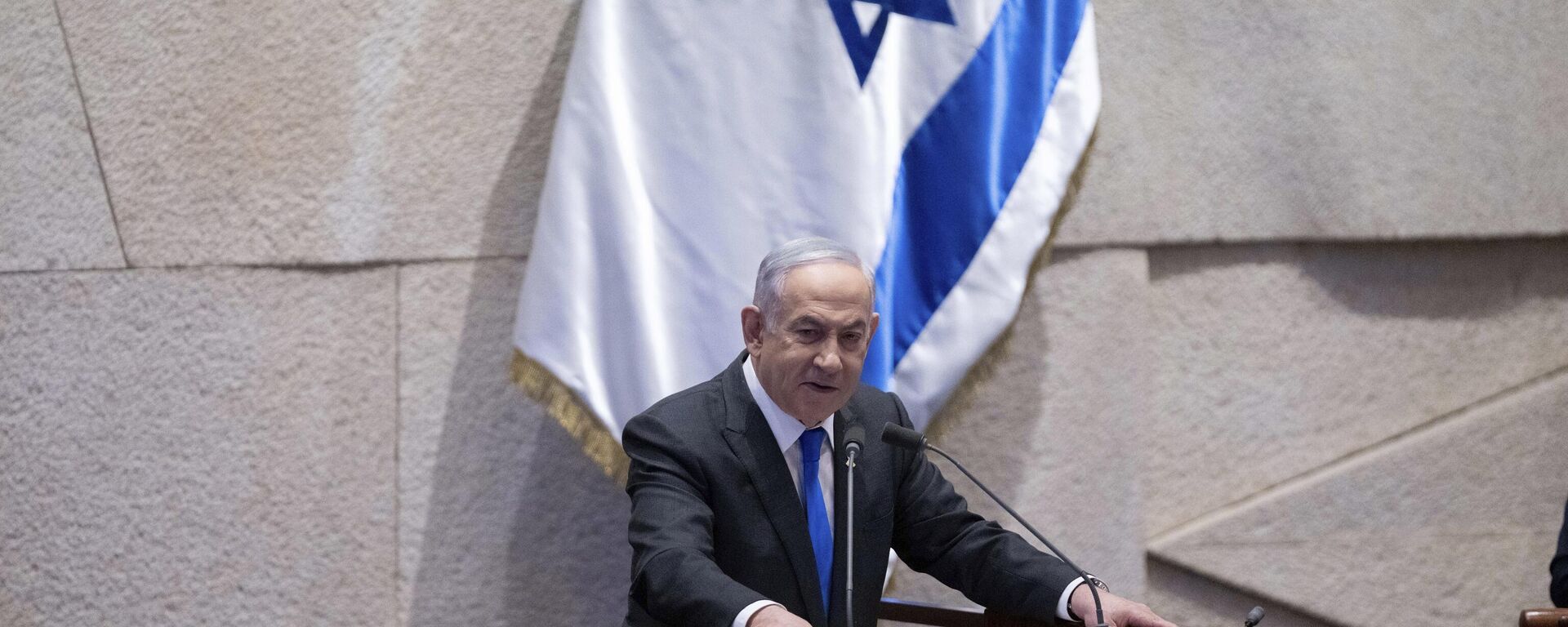https://sputnikglobe.com/20240725/netanyahus-nato-style-anti-iranian-alliance-idea-would-open-new-pandoras-box-in-middle-east-1119502953.html
Netanyahu’s NATO-Style Anti-Iranian Alliance Idea Would Open New Pandora’s Box in Middle East
Netanyahu’s NATO-Style Anti-Iranian Alliance Idea Would Open New Pandora’s Box in Middle East
Sputnik International
Israel’s prime minister has outlined an ambitious plan for the future of the Middle East's security architecture, proposing an anti-Iranian, NATO-style security pact dubbed the “Abraham Alliance.” Leading European Middle East policy expert Dr. Marco Carnelos has told Sputnik why the ambitious idea seems unlikely to get off the ground.
2024-07-25T14:32+0000
2024-07-25T14:32+0000
2024-07-25T14:32+0000
analysis
benjamin netanyahu
middle east
israel
iran
nato
alliance
abraham accords
https://cdn1.img.sputnikglobe.com/img/07e8/07/19/1119502626_0:161:3071:1888_1920x0_80_0_0_8b7a8c34b86cee70fa280753dde57c2f.jpg
“Now, here’s my vision for the broader Middle East. It’s also shaped in part by what we saw in the aftermath of World War II,” Prime Minister Benjamin Netanyahu told assembled US lawmakers in Washington, DC on Wednesday night.Netanyahu cited the April 14 Iranian drone and missile barrage on Israel, which was launched in response to the deadly April 1 Israeli missile attack on the Iranian consulate building in Damascus, Syria, as a “glimpse of what that potential alliance” could look like, referring to the US British, French and Jordanian warplanes deployed to help Israel, and the intelligence support provided by Gulf powers.“The new alliance I envision would be a natural extension of the groundbreaking Abraham Accords,” Netanyahu said, referencing the Arab-Israeli normalization agreements reached between Israel and Bahrain, the UAE, Morocco and Sudan with US mediation in 2020. Netanyahu dubbed his proposal the “Abraham Alliance.”The Kremlin reacted cautiously to the Israeli leader’s proposal. “Do we need confrontational mechanisms in the Middle East? It is unlikely, but you need to understand the details of Netanyahu’s reasoning before making any conclusions,” presidential spokesman Dmitry Peskov said, speaking to reporters after President Putin’s talks with Syrian President Bashar Assad on Thursday.More of the Same From Mideast’s Top Regime Change Cheerleader“The idea of an ‘Abraham Alliance’ is perfectly coherent with the policy Netanyahu has been pursuing for more than twenty years. He advocated something similar against Iraq in the early 2000s,” Dr. Marco Carnelos, a veteran retired Italian diplomat and former Middle East policy advisor to Prime Ministers Prodi and Berlusconi, told Sputnik, commenting on the substance of Netanyahu’s proposal.Carnelos isn’t sure Arab powers will be in any rush to support Netanyahu’s plan, particularly amid reputational blow Israel has suffered amid the ongoing war in Gaza. “Saudi Arabia’s position will be crucial, and honestly, at this stage, I do not know if [amid] the ongoing carnage in Gaza the Saudi [leadership] will be willing or can afford to join the Abraham Accords” normalization deal, much less “its military corollary targeted at Iran,” he said.Even Washington, Israel’s go-to whipping boy for Middle East adventurism, can’t necessarily be counted on when it comes to lining up against Iran militarily, according to Carnelos.“Israel is facing a stalemate,” the veteran retired European diplomat stressed, pointing out that that in nine months, the country has proven unable “to prevail [against] a bunch of militants hidden in a network of underground tunnels.""I could accept such an extended timeline if Israel had followed scrupulous rules of engagement to avoid civilian casualties, but they killed almost 40,000 people,” Carnelos concluded.
https://sputnikglobe.com/20240725/kremlin-on-creating-nato-analogue-in-middle-east-unlikely-that-such-mechanisms-needed-1119499798.html
https://sputnikglobe.com/20240724/us-cops-waged-unprovoked-attack-on-protesters-during-netanyahu-address--activist-1119490931.html
https://sputnikglobe.com/20240722/netanyahu-has-no-intention-to-reach-ceasefire-1119464537.html
israel
iran
Sputnik International
feedback@sputniknews.com
+74956456601
MIA „Rossiya Segodnya“
2024
News
en_EN
Sputnik International
feedback@sputniknews.com
+74956456601
MIA „Rossiya Segodnya“
Sputnik International
feedback@sputniknews.com
+74956456601
MIA „Rossiya Segodnya“
will israel ally with arab powers against iran, what is netanyahu's abraham alliance proposal
will israel ally with arab powers against iran, what is netanyahu's abraham alliance proposal
Netanyahu’s NATO-Style Anti-Iranian Alliance Idea Would Open New Pandora’s Box in Middle East
Israel’s prime minister has outlined an ambitious plan for the future of the Middle East's security architecture, proposing an anti-Iranian, NATO-style security pact dubbed the “Abraham Alliance.” Leading European Middle East policy expert Dr. Marco Carnelos has told Sputnik why the ambitious idea seems unlikely to get off the ground.
“Now, here’s my vision for the broader Middle East. It’s also shaped in part by what we saw in the aftermath of World War II,” Prime Minister Benjamin Netanyahu
told assembled US lawmakers in Washington, DC on Wednesday night.
“After that war, America forged a security alliance in Europe to counter the growing Soviet threat. Likewise, America and Israel today can forge a security alliance in the Middle East to counter the growing Iranian threat. All countries that are peace with Israel and all those countries who will make peace with Israel should be invited to join this alliance,” Netanyahu suggested.
Netanyahu cited the April 14 Iranian drone and missile barrage on Israel, which was launched in response to the deadly April 1 Israeli missile attack on the Iranian consulate building in Damascus, Syria, as a “glimpse of what that potential alliance” could look like, referring to the US British, French and Jordanian warplanes deployed to help Israel, and the intelligence support provided by Gulf powers.
“The new alliance I envision would be a natural extension of the groundbreaking Abraham Accords,” Netanyahu said, referencing the Arab-Israeli normalization agreements reached between Israel and Bahrain, the UAE, Morocco and Sudan with US mediation in 2020. Netanyahu dubbed his proposal the “Abraham Alliance.”
The Kremlin reacted cautiously to the Israeli leader’s proposal. “Do we need confrontational mechanisms in the Middle East? It is unlikely, but you need to understand the details of Netanyahu’s reasoning before making any conclusions,” presidential spokesman Dmitry Peskov said, speaking to reporters after President Putin’s talks with Syrian President Bashar Assad on Thursday.
More of the Same From Mideast’s Top Regime Change Cheerleader
“The idea of an ‘Abraham Alliance’ is perfectly coherent with the policy Netanyahu has been pursuing for more than twenty years. He advocated something similar against Iraq in the early 2000s,” Dr. Marco Carnelos, a veteran retired Italian diplomat and former Middle East policy advisor to Prime Ministers Prodi and Berlusconi, told Sputnik, commenting on the substance of Netanyahu’s proposal.
“At the time it was not called the ‘Abraham Alliance’, but it accomplished a change of regime in Iraq in 2003, which delivered at least fifteen years of conflict and instability in the region,” Carnelos recalled. “Now, [Israel] is trying to achieve the same result vis-à-vis Iran, and if it will succeed – by bamboozling the US again, another twenty years of mayhem” will ensue, according to the observer.
Carnelos isn’t sure Arab powers will be in any rush to support Netanyahu’s plan, particularly amid reputational blow Israel has suffered amid the ongoing war in Gaza. “Saudi Arabia’s position will be crucial, and honestly, at this stage, I do not know if [amid] the ongoing carnage in Gaza the Saudi [leadership] will be willing or can afford to join the Abraham Accords” normalization deal, much less “its military corollary targeted at Iran,” he said.
Riyadh has dramatically shifted its security and foreign policy in recent years, signing a surprise diplomatic normalization deal with Iran mediated by Iran in 2023, joining BRICS+ earlier this year, and committing to a peaceful resolution to the decade-old civil war in Yemen.
Even Washington, Israel’s go-to whipping boy for Middle East adventurism, can’t necessarily be counted on when it comes to lining up against Iran militarily, according to Carnelos.
“I should not rush to equate the 58 standing ovations attributed to Netanyahu by the US Congress to be an automatic US determination to go to war…for Israel,” he said, pointing out that Washington’s priorities have shifted to China.
“Israel is facing a stalemate,” the veteran retired European diplomat stressed, pointing out that that in nine months, the country has proven unable “to prevail [against] a bunch of militants hidden in a network of underground tunnels."
"I could accept such an extended timeline if Israel had followed scrupulous rules of engagement to avoid civilian casualties, but they killed almost 40,000 people,” Carnelos concluded.





